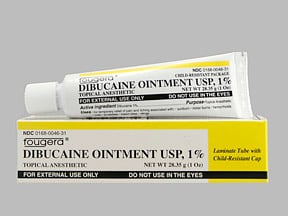
Dibucaine Coupons & Savings Card – Discount Prices from $5.73
Generic for: Cvs hemorrhoidal & analgesic
Dibucaine is a topical medication used to alleviate pain and itching associated with skin irritations such as insect bites, minor burns, scrapes, eczema, and hemorrhoids. As a local anesthetic, it temporarily numbs the affected area by acting on the nerves to reduce the sensation of pain and discomfort. Although this medication provides short-term relief, it may need to be reapplied several times throughout the day for continued comfort. Always consult with a healthcare professional before using any medication to ensure it is appropriate for your specific condition.
Our coupons are free to use. Before paying, show the pharmacist your Dibucaine savings card to get your free discount. Use our filters below to edit the prescription box to match your needs. The Dibucaine prices will update based on your prescription needs. Above our Dibucaine coupons, you can change your location to see pharmacy prices and costs in other areas. We're here to help you buy Dibucaine at the lowest price with our prescription discount card.
My prescription
Edit
28GM of 1%, Dibucaine (1 Tube)
Select pharmacy

Walgreens
$5.73
COUPON PRICE
Albertsons
$7.90
COUPON PRICE
Walmart
$15.35
COUPON PRICEDibucaine savings card
Show this card to your pharmacist
Albertsons
$7.90
BIN
ID
PCN
GRP
011867
LHF6420C2B
HT
LABH001
Powered by
Dibucaine is a topical medication used to alleviate pain and itching associated with skin irritations such as insect bites, minor burns, scrapes, eczema, and hemorrhoids. As a local anesthetic, it temporarily numbs the affected area by acting on the nerves to reduce the sensation of pain and discomfort. Although this medication provides short-term relief, it may need to be reapplied several times throughout the day for continued comfort. Always consult with a healthcare professional before using any medication to ensure it is appropriate for your specific condition.
Our coupons are free to use. Before paying, show the pharmacist your Dibucaine savings card to get your free discount. Use our filters below to edit the prescription box to match your needs. The Dibucaine prices will update based on your prescription needs. Above our Dibucaine coupons, you can change your location to see pharmacy prices and costs in other areas. We're here to help you buy Dibucaine at the lowest price with our prescription discount card.
Related local anesthetics prescriptions
More prescriptions for hemorrhoids
coupons from$42.64Save 89%
coupons from$25.29Save 76%
coupons from$16.94Save 83%
coupons from$288.30Save 92%
coupons from$79.46Save 91%
coupons from$10.84Save 78%
coupons from$26.49Save 72%
coupons from$7.99Save 64%
Related local anesthetics prescriptions
Sarna Save 71%coupons from $9.16
Cetacaine Save 77%coupons from $137.84
Pramoxine Save 55%coupons from $9.47
Recticare Save 41%coupons from $14.91
Lidocaine Save 93%coupons from $1.01
Alcaine Save 71%coupons from $20.39
Bupivacaine Save 91%coupons from $1.01
Cepacol Save 80%coupons from $6.17
More prescriptions for hemorrhoids
Analpram Hc Singles Save 89%coupons from $42.64
Proctocort Save 76%coupons from $25.29
Proctofoam Save 83%coupons from $16.94
Hydrocortisone Acetate Save 92%coupons from $288.30
Lidocaine-hydrocortisone Ace Save 91%coupons from $79.46
Proctosol Hc Save 78%coupons from $10.84
Recticare Advanced Save 72%coupons from $26.49
Nupercainal Save 64%coupons from $7.99
Dibucaine dosage forms
Use our Dibucaine 28GM coupon with prices from $8.57 for 1 Tube. You can also use our Dibucaine 28GM coupon with prices from $9.63 for 2 Tubes. We have a Dibucaine 28GM coupon with prices from $10.70 for 3 Tubes.
Dosage Quantity Price from Per unit 28GM 1 Tube $8.57 $8.57 28GM 2 Tubes $9.63 $4.82 28GM 3 Tubes $10.70 $3.57
| Dosage | Quantity | Price from | Per unit |
|---|---|---|---|
| 28GM | 1 Tube | $8.57 | $8.57 |
| 28GM | 2 Tubes | $9.63 | $4.82 |
| 28GM | 3 Tubes | $10.70 | $3.57 |
